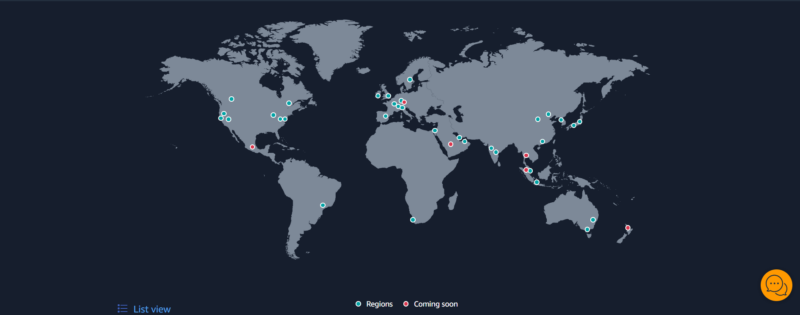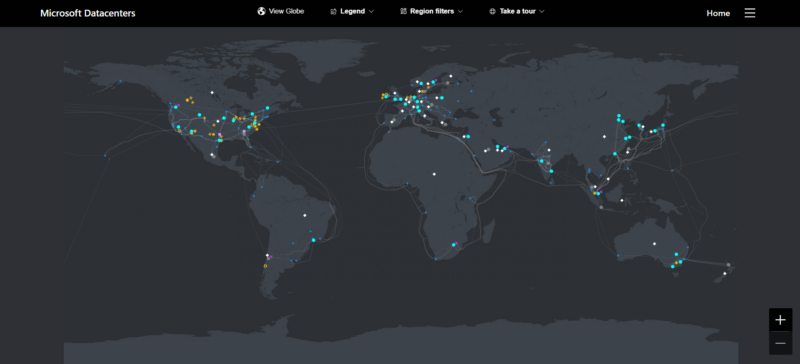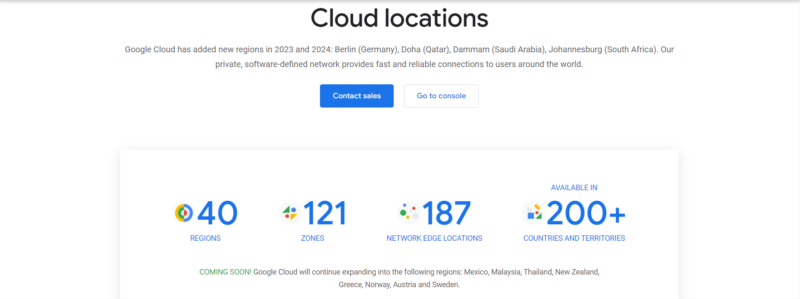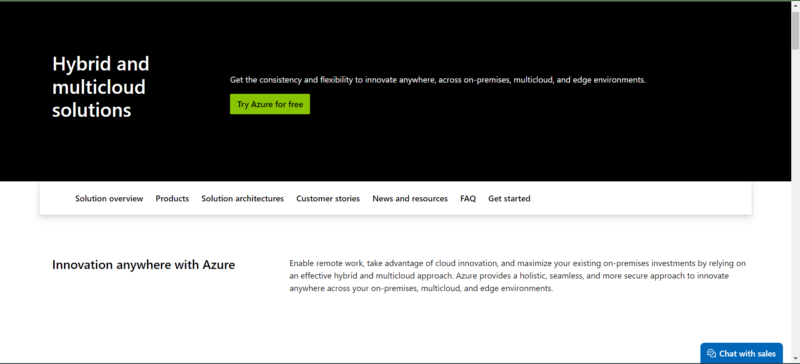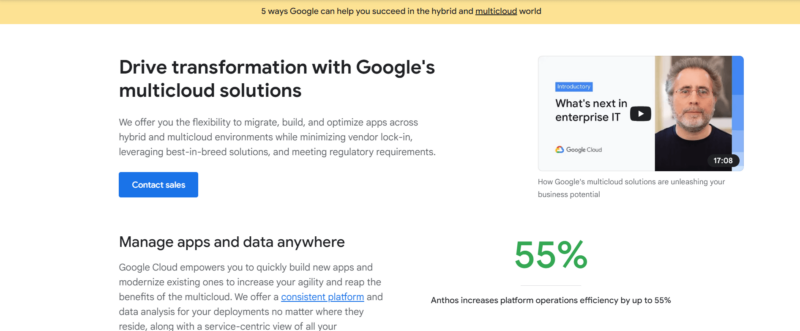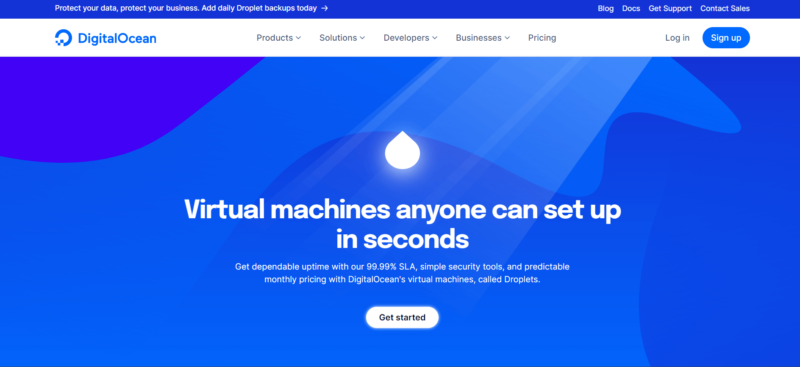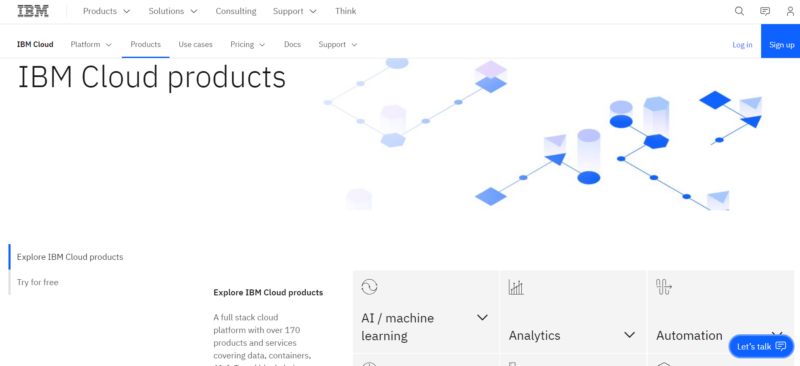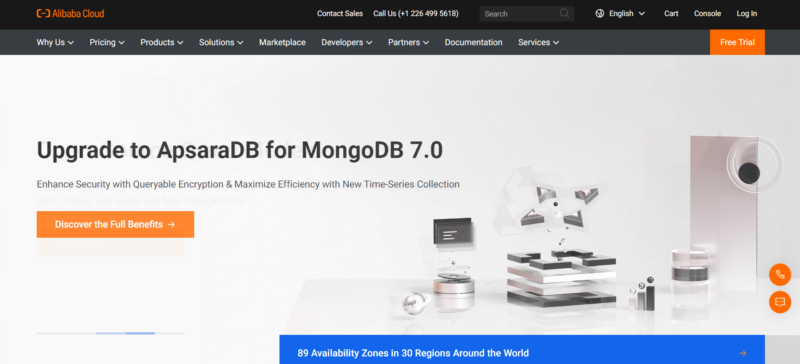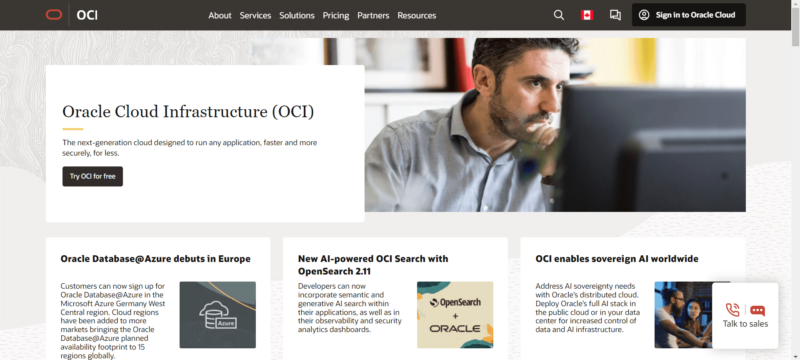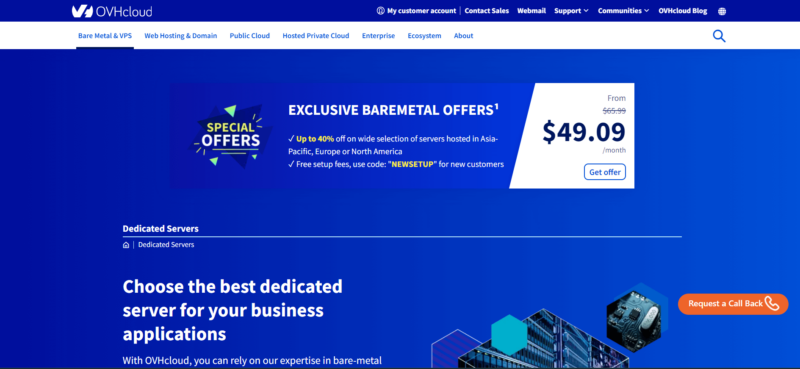AWS vs Azure vs Google Cloud: Comparison of the Big Three Cloud Providers
The cloud computing market is dominated by three giants that together constitute more than half of the global market share. In this showdown of the cloud giants, we compare the features, ease of use, use cases, service ranges and prices of AWS vs Azure vs Google Cloud.
The AWS vs Azure vs Google Cloud debate is often contested. Since all three cloud providers have some of the best internet-based computing services, wading through countless services and pricing tiers can be daunting. Choosing the right one often depends on your use case (such as single cloud vs multi cloud) and budget, so knowing each platform’s strengths and weaknesses will let you make an educated decision.
Amazon Web Services (AWS) is currently the largest provider in the commercial cloud computing world. However, considering that it made cloud computing mainstream, this comes as no surprise.
Microsoft Azure is the closest contender to AWS in terms of market size. It is popular for its seamless integration with other Microsoft products and services. Google Cloud Platform (GCP) has the third-highest international market share. Its core strength lies in big data and machine learning.
The following table is a comparison of AWS, Microsoft Azure and GCP based on various factors such as market share, pricing, tools, availability and more.
| Factors: | AWS | Microsoft Azure | GCP |
|---|---|---|---|
| Launching Year | 2006 | 2010 | 2008 |
| Market Share | High (31-33%) | High (21-24%) | Moderate (11%) |
| Pricing | Cheaper for on-demand general purpose compute instances | Cheaper for compute-optimized instances | Cheaper overall |
| Services | Over 250 | Over 200 | Over 200 |
| Data Centers | Over 200 (estimated) | Over 300 | At least 100 (estimated) |
| Regions | 33 | Over 60 | 40 |
| Availability Zones | 105 | No official data | 121 |
| Uptime SLA | Up to 99.9% | Up to 99.9% | Up to 99.9% |
| Compute Services | EC2, Lambda | Virtual machines | Compute engine |
| Database Services | RDS, DynamoDB | SQL Database, Cosmos DB | Cloud SQL |
| Storage Services | S3, EBS | Blob Storage, Azure Files | Cloud Storage |
| DNS Services | Route 53 | Azure DNS | Cloud DNS |
| Security Tools | IAM, AWS Security | Azure Active Directory, Azure Security Center | Identity & Access Control |
| Deployment Models | Public, private, hybrid | Public, hybrid, multi-cloud | Public, hybrid, multi-cloud |
| Open-Source Support |
What Is the Difference Between AWS, Azure and GCP?
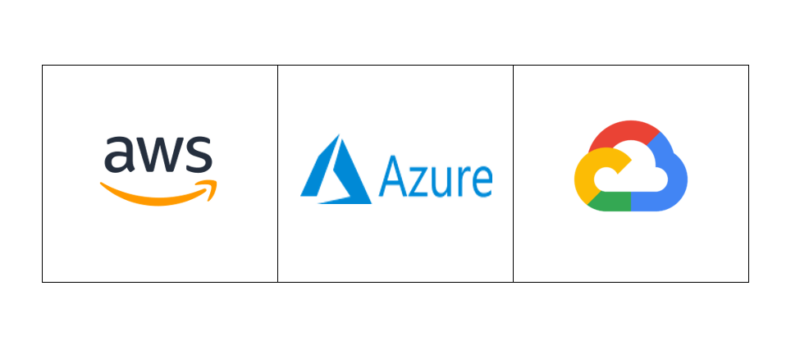
Of all three cloud computing technology providers, AWS — launched by Amazon in 2006 — has been around the longest. Its key strength lies in having the broadest range of services.
GCP is owned by Google and came two years after AWS. While it may not have the same service range and infrastructural coverage as AWS and Azure, it thrives in the big data, AI and machine learning fields.
Azure launched two years after GCP and four years after AWS. It has the highest number of regions, with its key strengths being hybrid/multi-cloud security and ease of integration with Microsoft products.
Market Share Comparison of Amazon Web Services, Azure and GCP
According to studies by the Synergy Research Group AWS had the highest market share (a position it has maintained for well over a decade) with an estimated 31-33% in 2022 and 2023. Azure saw some growth between 2022 and 2023, going up within the 21-24% range. Placing third, GCP maintained its 11% market share from 2022 through 2023.
Amazon Web Services remains the clear leader in the market. Azure may have edged closer in the past few years, but AWS will probably maintain its lead for at least a while. The growing adoption of data analytics and AI may give GCP a significant boost in the years to come.
Cloud Adoption Comparison of AWS, Google Cloud and Azure
Cloud adoption is the process through which organizations implement cloud technologies for their operations. The goal varies from cost efficiency and scalability to reliability and flexibility. Earlier cloud adoption strategies focused primarily on using a single cloud service provider. According to a 2022 Cisco study, organizations are increasingly adopting hybrid cloud deployments.
All three cloud providers saw a year-on-year decrease in their adoption between 2022 and 2023, according to Flexera’s 2023 State of the Cloud Report. At the moment, AWS and Azure have roughly the same level of cloud adoption, but more organizations run their most significant workloads on AWS. GCP has positive prospects, as more companies are either experimenting with it or planning to use it.
Pricing Comparison of AWS, Microsoft Azure and Google Cloud
Generally, all three major cloud providers have a pay-as-you-go pricing model. Of course, depending on the specific service and other factors, there may be some exceptions. Each of them offers some form of discount and a free tier.
This pricing comparison is based on Ubuntu/CentOS Linux instances in Eastern U.S. regions across all three cloud providers.
Compute Services Comparison of Microsoft Azure, Google Cloud and AWS
Compute services provide computing resources such as virtual machines and instances over the internet. All three cloud providers offer similar compute cloud services. However, AWS excels in its diversity, while Azure stands out for its seamless integration with existing Microsoft services.
GCP also integrates well with Google’s data analytics tools, but its primary strength is its cost-effectiveness.
| Service: | AWS | Microsoft Azure | GCP |
|---|---|---|---|
| Virtual Machine | Amazon Elastic Compute Cloud | Virtual Machines (VM) | Google Compute Engine (GCE) |
| PaaS | AWS Elastic Beanstalk | Azure App Service | Google App Engine |
| Container | AWS Elastic Container Service, Elastic Kubernetes Services | Azure Container Apps, Azure Kubernetes Service | Google Cloud Run, Google Kubernetes Engine |
| Serverless Functions | AWS Lambda | Azure Functions | Google Cloud Functions |
Storage Services Comparison of Azure, AWS and Google Cloud
Cloud storage services are digital storage that’s offered over the internet. They are scalable, managed storages used in place of physical storage devices.
All three cloud service providers offer block, file and object storage. However, AWS is feature-rich, while GCP might be the most cost-effective for big data. Azure is a top option for easy integration with other Microsoft environments.
| Service: | AWS | Microsoft Azure | GCP |
|---|---|---|---|
| Object Storage | Amazon Simple Storage Service (S3) | Azure Blob Storage | Google Cloud Storage |
| Virtual Server Disks | Amazon Elastic Block Store (EBS) | Azure Managed Disks | Google Cloud Persistent Disk |
| Cold Storage | Amazon S3 Glacier | Azure Archive Blob Storage | Google Cloud Nearline Storage |
| File Storage | Amazon Elastic File System (EFS) | Azure Files | Google Cloud Filestore |
Database Service Comparison of Azure, AWS and Google Cloud
Database services are databases that are built, accessed and managed over the internet. They are pretty much the same as regular databases but with the added advantage of scalability, flexibility and durability.
The big three cloud providers offer both relational and non-relational database services. AWS offers a vast array of options, while Azure has a simpler price structure. GCP’s BigQuery stands out for its speed with intensive data analytics and machine learning models.
| Service: | AWS | Microsoft Azure | GCP |
|---|---|---|---|
| RDBMS | Amazon Relational Database Service (RDS) | Azure SQL Database | Google Cloud SQL |
| NoSQL: Key-Value | Amazon DynamoDB | Azure Cosmos DB | Google Cloud Datastore, Google Cloud Bigtable |
| NoSQL: Indexed | Amazon SimpleDB | Azure Table Storage | Google Cloud Datastore |
Specialized Services Comparison of Azure, AWS and Google
Database services are databases that are built, accessed and managed over the internet. They are pretty much the same as regular databases but with the added advantage of scalability, flexibility and durability.
The big three cloud providers offer both relational and non-relational database services. AWS offers a vast array of options, while Azure has a simpler price structure. GCP’s BigQuery stands out for its speed with intensive data analytics and machine learning models.
| Service: | AWS | Microsoft Azure | GCP |
|---|---|---|---|
| RDBMS | Amazon Relational Database Service (RDS) | Azure SQL Database | Google Cloud SQL |
| NoSQL: Key-Value | Amazon DynamoDB | Azure Cosmos DB | Google Cloud Datastore, Google Cloud Bigtable |
| NoSQL: Indexed | Amazon SimpleDB | Azure Table Storage | Google Cloud Datastore |
Specialized Services Comparison of Azure, AWS and Google
Besides their core services like compute, storage and databases, all three cloud platforms offer specialized services. These services satisfy distinctive needs in areas like the Internet of Things, AI and machine learning, analytics services and mixed reality.
The following table highlights some of the specialized cloud services from Azure, Google and AWS:
| Service: | AWS | Microsoft Azure | GCP |
|---|---|---|---|
| DevOps | AWS CodePipeline, AWS CodeBuild, AWS CodeDeploy, AWS CodeStar | Azure Boards, Azure Pipelines, Azure Repos, Azure Test Plans, Azure Artifact | Cloud Build, Artifact Registry, Tekton, Google Cloud Deploy, Binary Authorization, Operations Suite |
| AI & Machine Learning | Amazon Polly, Amazon Transcribe, Amazon Lex, Amazon SageMaker, Amazon Bedrock | Azure AI Immersive Reader, Azure AI Metrics Advisor, Azure Machine Learning, Azure Content Moderator | Vertex AI Studio, Translate AI, Gemini Code Assist, Document AI, Dialogflow |
| Internet of Things | FreeRTOS, Amazon IoT, Amazon Kinesis Video Streams | Azure RTOS, Azure IoT, Azure Sphere, Windows for IoT | Cloud IoT Core |
| Game Development | Amazon Lumberyard, Amazon GameLift | Azure PlayFab | Google Cloud for Games |
| Business Analytics | Amazon QuickSight, Clickstream Analytics on AWS | Azure BI Tool | Looker, BigQuery |
| End User Computing | Amazon WorkSpaces, Amazon AppStream | Azure Virtual Desktop | N/A |
| Robotics | AWS RoboMaker | Microsoft Power Automate | N/A |
In general, AWS’ specialized services are well established, making them a great option for big organizations. Beyond that, AWS offers more specialized cloud services than Azure and GCP.
That said, Azure is doing pretty well on the AI front, and GCP remains strong in the analytics, machine learning and AI fields. Unlike AWS and Azure, GCP doesn’t have dedicated robotics and end user computing services.
Data Centers Comparison of Google, Azure and AWS
A data center is the physical location of computer systems and components, particularly those used to offer cloud services.
Uptime and Latency Comparison of Azure, Google Cloud and AWS
While they may vary by service, AWS, Azure and GCP guarantee uptimes of up to 99.9% based on their service level agreements.
Proximity plays a part in latency. On average, AWS has lower latency than Azure, with GCP coming in third. However, in some European and South American regions, Azure blazes past AWS to take the top spot.
Networking Comparison of AWS, Azure and GCP
When it comes to cloud computing services, networking involves the creation of virtual systems that connect cloud resources. In simpler terms, cloud networking is the virtual route that goes to and from the cloud resources.
AWS Virtual Private Cloud (VPC) offers more features, but Azure’s Virtual Networks (VNets) are more flexible geographically since they can span more regions. Unlike the other two, GCP uses Global VPC, a type of virtual network that spans multiple regions. In fewer words, GCP’s virtual networks are global, not regional. Thus, they are centralized and somewhat easier to manage.
| Service: | AWS | Microsoft Azure | GCP |
|---|---|---|---|
| Virtual Network | AWS Virtual Private Cloud (VPC) | Azure Virtual Networks (VNets) | Cloud VPC |
| Elastic Load Balancer | Elastic Load Balancing (ELB) | Azure Load Balancer | Cloud Load Balancing |
| On-Premises-to-Cloud Peering | AWS Direct Connect | Azure ExpressRoute | Cloud Interconnect |
| DNS | Amazon Route 53 | Azure DNS | Cloud DNS |
Cloud Security Tools Comparison of AWS, Azure and GCP
Cloud security tools are virtual solutions designed to safeguard data, applications and resources within a cloud infrastructure. For maximum efficiency, these tools must be combined with appropriate security policies.
All three providers offer some similar cloud security tools; namely, identity and access management, compliance, application security and threat detection.
For example, AWS has IAM and Azure has Entra ID, while GCP has Cloud IAM, which are all identity and access management tools. For threat detection, AWS has GuardDuty, Azure has Sentinel and GCP has the Security Command Center.
The big three also have unique security tools. However, those unique tools are often specialized. AWS offers a broader range of options, while Azure is more often preferred in hybrid cloud environments. In some instances, GCP security tools offer a more user-friendly interface.
| Service: | AWS | Microsoft Azure | GCP |
|---|---|---|---|
| Identity & Access Management | AWS Identity & Access Management (IAM), IAM Identity Center, Amazon Cognito, AWS Directory Service | Microsoft Entra ID, Azure RBAC | Cloud Identity & Access Management, Identity Platform |
| Detection & Response | Amazon GuardDuty, Amazon Inspector | Microsoft Sentinel, Defender for Cloud | Chronicle, Security Command Center |
| Network & Application Protection | AWS Web Application Firewall and AWS Shield | Azure Web Application Firewall, DDoS Protection Service | Google Cloud Armor, Google Cloud Armor Managed Protection Plus |
| Data Protection | AWS Key Management Service, AWS Certificate Manager | Key Vault, App Service Certificates | Cloud KMS & Cloud HSM |
| Compliance | AWS Artifact | Service Trust Portal | Compliance Reports Manager |
| Cost Management Tools | AWS Billing and Cost Management | Microsoft Cost Management | Cloud Billing & Cost Table Reports |
Hybrid and Multi-Cloud Comparison of AWS, Azure and GCP
Cloud deployment models define the access, ownership and management of cloud infrastructure. The typical deployment models are public cloud, private cloud and hybrid cloud. Of these three, hybrid/multi-cloud models are most popular with enterprises, and all of the top three cloud providers offer services for them.
Open-Source Support Comparison of AWS, Azure and Google Cloud Platform
GCP has the strongest open-source support. Built on many open-source technologies, it’s highly active in open-source communities. Azure’s open-source support is almost comparable to that of GCP, and both providers operate and contribute to open-source projects. For example, GCP has Knative, a serverless solution for running applications on Kubernetes, and Azure has Visual Studio Code.
While AWS also has a significant level of open-source support, it gives precedence to its branded services. Thus, the overall open-source terrain in AWS is a bit uneven. In other words, the level of open-source support depends on the service. For instance, AWS CLI, SDK and CDK have fair levels of open-source support, but GuardDuty and Inspector don’t.
All three platforms offer thorough documentation, video tutorials and some level of community support.
Use Case Comparison of AWS, Azure and Google Cloud Platform
Azure is optimal for use in hybrid/multi-cloud environments and for integration with extant Microsoft technologies. But when it comes to large-scale businesses and enterprise needs, AWS stands out thanks to its extensive range of services. GCP comes in handy for novel solutions, particularly in the machine learning, big data and AI fields.
| Notable Users of AWS | Notable Users of Azure | Notable Users of GCP |
|---|---|---|
| Disney | Siemens | Uber |
| Samsung | AMD | GitLab |
| Verizon | Bridgestone | Goldman Sachs |
| GoDaddy | Adobe | Walmart |
| Toyota | Motionlab | eBay |
| Snap | McDonald’s | MariaDB |
| HP | Suzuki | Forbes |
| T-Mobile | PwC | Johnson & Johnson |
| McDonald’s | KPMG | Etsy |
| Deliveroo | Volvo | Pizza Hut |
Pros & Cons: AWS vs Azure vs Google Cloud
Each cloud platform has its advantages and disadvantages. We will explore each provider in detail.
What Factors to Consider When Choosing Between AWS, Azure and Google Cloud Platform?
Various factors come into play when trying to choose a cloud provider between AWS, Azure and GCP. Such factors include scalability, use cases, existing infrastructure and budget.
- Use case: For larger deployments with complex needs, AWS thrives. However, GCP cruises when it comes to big data, AI and ML. In the hybrid cloud and Microsoft integration domain, Azure takes the lead.
- Existing infrastructure: Azure cloud computing is best if your existing infrastructure is primarily Microsoft. However, outside of that, any of the three providers should be fine.
- Budget: On the budget front, GCP is thought to be the most cost-friendly alternative of the big three. However, depending on your specific needs, the most economical option could be any of them.
- Security needs: Azure and AWS can handle security needs in hybrid cloud environments. AWS is particularly good for complex security needs in various environments.
- Scalability: When it comes to scalability, AWS takes the cake, enabled by its immense infrastructure.
- Ease of use: AWS might require more effort to learn because of its vast offerings, whereas GCP has a relatively easy-to-use interface. Azure is somewhere in the middle, and it’s notably easier for people who are already familiar with Microsoft.
- Support: All three providers offer multiple support levels.
- Provider lock-in: When choosing a service on any of the three platforms, consider the ease of switching to a different provider.
What Are the Benefits of Migrating to Cloud Computing?
Cloud computing is highly cost-effective. Beyond that, the other benefits of cloud computing include improved flexibility, scalability, innovation, robustness, security and disaster recovery. If done correctly, migrating between different cloud providers (such as migrating from Google Cloud to AWS) is a simpler process than migrating from on-premises.
What Are Some Alternatives to the Big 3 Cloud Platforms?
Some other cloud providers offer unique services, which may not be available or as desirable in the big three. They serve as capable alternatives depending on your use case.
Final Thoughts
The choice between AWS, Azure and GCP often depends on budget, use case, existing infrastructure and the complexity of your needs. But ultimately, all three cloud platforms offer similar services such that they are interchangeable in most cases. If you’re looking for more options, we have an article about the most popular cloud computing platforms.
Of all three cloud providers, which do you prefer? What’s the reason for this choice? Did you try all three out before making a decision? Let us know your thoughts in the comments. Thank you for reading.
FAQ: Azure vs AWS vs GCP
The top three cloud providers by market share and reach are Azure, AWS and Google Cloud Platform (GCP).
The choice between AWS and Azure depends on the use case. For hybrid clouds, Azure is preferable, but AWS is usually better for scalability.
There’s no universal best choice between GCP, AWS and Azure. In any instance, the best choice depends on the use case. While GCP thrives on AI, ML and big data, Azure excels when integrating with Microsoft infrastructure. However, AWS offers the most options, making it optimal for complex needs and very large projects.
The best cloud platform is the one that satisfies your unique use case. AWS would be the best for complex security needs, while GCP is often cost-effective. Azure works well with existing Microsoft infrastructure.


